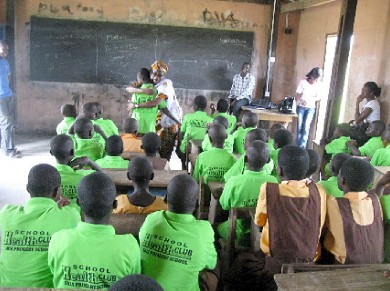
Sustainable access to improved sanitation has long been a challenge in the developing world, but mere access to sanitation is not the whole story. USAID's West Africa Water Initiative (WAWI) Global Development Alliance is piloting an innovative sanitation intervention that goes beyond providing latrines and instead uses participatory activities to motivate entire communities to decide to build and use them.
In 2008, 224 million people in Sub-Saharan Africa (about one-quarter of the population) practiced open defecation, drastically increasing rates of intestinal disease and polluting drinking water sources. To combat this health threat, WAWI partners decided to test Community-Led Total Sanitation (CLTS) programs in Mali, Ghana, and Burkina Faso.
Traditional sanitation programs that focus on building latrines have proven both too expensive to cover the two-thirds of the population in Sub-Saharan Africa without access to improved sanitation, and ineffective in changing behaviors so that sanitation facilities are actually used over time. Pure CLTS programs, developed in 1999 by Dr. Kamal Kar in Bangladesh, are low-cost because they provide no subsidies to build latrines, and focus on achieving sustained sanitation demand and behavior change. CLTS instead relies on highly trained facilitators to help communities analyze their current sanitation practices through a series of participatory exercises that help community members confront the reality of negative impacts of mass open defecation, including demonstrating how people are consuming each other's feces in unsanitary environments. The approach works to trigger feelings of disgust and shame that lead to rapid collective behavior change. As a result, "communities are motivated to spend their own money to build latrines themselves," according to Sean Cantella, Chief of Party for the WAWI program, not because they have been given the money to do so, but because they want to use them.
USAID is working with WAWI partners, UNICEF and WaterAid, to test several modified CLTS approaches to find more effective ways to improve sanitation in West Africa. The pilot efforts include both "pure" CLTS as well as methodologies hybridized with traditional sanitation promotion approaches. All the interventions work towards communities achieving Open Defecation Free (ODF) status. Once local officials formally "certify" a community as ODF, WAWI partners erect an ODF sign and host a celebration.
WAWI is currently piloting CLTS efforts in three countries:
- Only 36% of Mali's rural communities have access to improved sanitation facilities. In association with UNICEF Mali, Plan Mali and SNV conducted pure CLTS projects targeting 70,800 people in 120 villages. Every one of the villages received ODF certification.
- Today, 13% of Ghana's rural population has access to improved sanitation. Rural Aid worked with 6,700 people in ten communities that fed into five different schools in Northern Ghana. The hybrid CLTS initiative conducted traditional community motivation, complemented by subsidized school latrines, water catchment systems, and potable water wells at area schools. Ghana's Government has now officially adopted the CLTS approach to scale up rural sanitation to meet its goal of 56.5% rural coverage.
- With 11% rural access to improved sanitation in Burkina Faso, WaterAid Burkina Faso is implementing hybrid CLTS initiatives with approximately 9,000 people in eight communities and providing water wells and pumps as incentives to those who follow through on pledges to build latrines to all targeted CLTS communities.
The success of CLTS programs largely depends on facilitators who can successfully carry out the graphic triggering process, and is also linked to community structure and cohesion. According to Sean Cantella, "CLTS seems most effective in rural areas, given the power of peer pressure in small community settings. Communities have to be willing to go all in or it won't have the desired effects." Partners have found that programs have less impact in peri-urban situations due to weaker community ties.
WAWI partners have found an effective way to trigger rapid changes in sanitation behavior through CLTS. Now they are exploring options for expanding the program, including integrating CLTS with sanitation marketing and credit programs to help communities meet the increased demand for household latrines. Partners are also drawing on social marketing principles to build demand for better sanitation options and increase local capacity to supply improved latrines. These and other innovations will allow CLTS programs to improve sanitation on a larger scale, a goal the partners are dedicated to achieving.
For more information, visit:
www.communityledtotalsanitation.org/
www.wateraid.org/uk/what_we_do/how_we_work/community_led_total_sanitation/default.asp







Comment
Make a general inquiry or suggest an improvement.